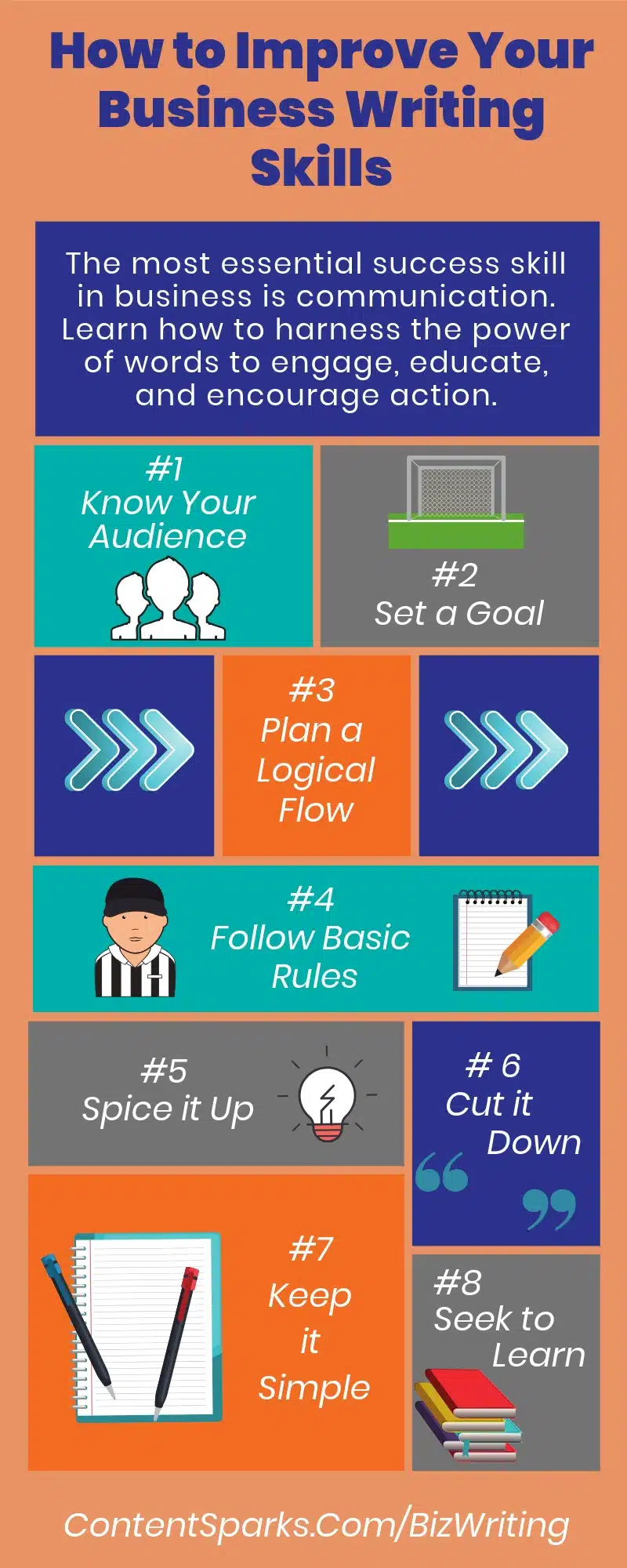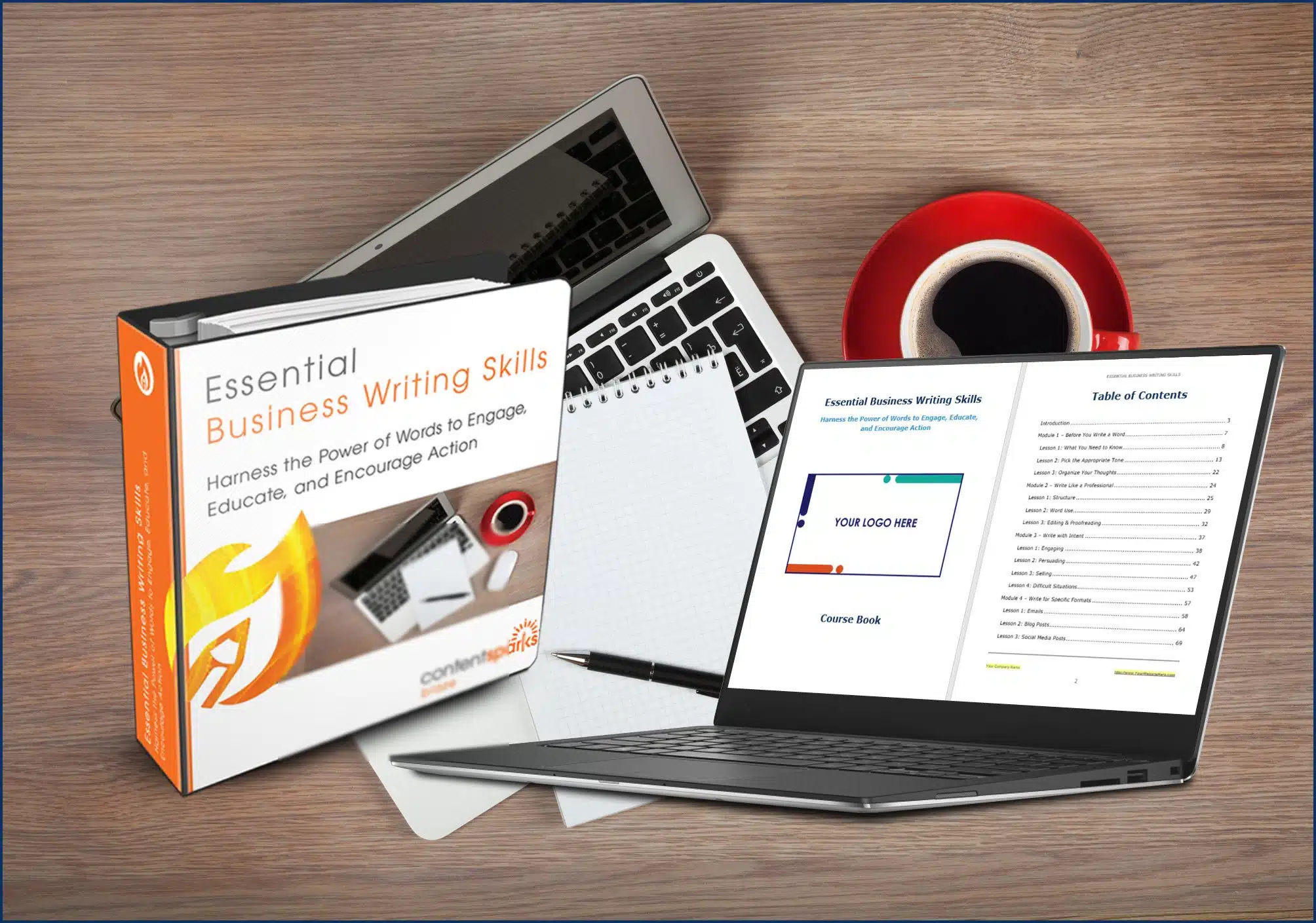The most essential success skill in business is communication, whether it's with customers and clients, prospects, employees, colleagues, or vendors and contractors.

How well you communicate directly impacts your effectiveness at building relationships, getting your point across, persuading others to take action, and explaining exactly what they need to do
Poor communication skills can result in confused clients, poor quality work from employees, the wrong deliverables from vendors, ineffective lead generation, low customer conversion rates, rejected business proposals, high bounce rates on your blog, and a host of other problems.
Practically every interaction in your business requires some form of communication. And the written word is still the primary communication channel, which is why you need to continuously work on enhancing and honing your writing skills.
How can you improve your business writing skills?
I've been writing content in one form or another daily for years, as well as outsourcing some of the writing for our product development. As a result, I've seen the good, the bad, and the ugly from even professional writers.
If you truly want to become an exceptional business writer, follow these time-proven tips:

#1 Know Your Audience
Before you start writing, describe your target readers. What are their challenges? Find out what they think, feel, want, hate, enjoy. Note any words and phrases they use when they talk about their challenges.
Keep all of that in mind throughout your writing and your audience will be able to relate to you and your message.
#2 Set a Goal
Have a specific goal in mind for whatever you're writing. What do you want to achieve with this piece of writing? What message do you want your readers to understand? How will they benefit from what they're reading? And what do you want them to do or take action on once they've finished?
#3 Plan a Logical Flow
Outlines are critical to figuring out how you'll take people from point A to point B, especially for a longer piece of writing. Before you jump in and start writing complete sentences and paragraphs, create an outline with at least the following:
- Introduction or Overview
- Key points to cover, broken up by sections if there are a lot
- Conclusion or Summary
- Call to Action (what people should do)
Once you have your outline, you can write freely and not worry about whether you're following a logical path that people can understand.
#4 Follow Basic Rules
Grammar and word choice matters. Even before you write, determine the tone that make sense for your readers. Will it be formal or informal? What language or jargon should you avoid?
For anything that's not extremely formal, such as a scientific research paper, stick with first and second person (I, me, you, your, we, us, etc). That makes your writing more engaging and dynamic.
Finally, while it's OK to break the rules in some situations, you need to know those grammar rules before you can decide whether to break them. Commas, spelling, definitions – check your work by running it through a spell check and getting someone to proofread it.
#5 Spice it Up
Avoid relying on the same words and phrases over and over. Instead, use a thesaurus to come up with alternatives. And think about more powerful, emotional words for situations where you want people to pay closer attention. Engage their senses on all fronts – taste, smell, feel, hear.
To make your writing even more engaging, tell stories and give examples that your readers can relate to.
#6 Cut it Down
Most people use twice as many words as necessary to get their point across. Be economical about how many words you use to explain something.
When you read through your writing, look out for examples and words that don't add value. And be on the alert for repetition of concepts or redundant words.
#7 Keep it Simple
If you want people to understand and connect with you, it's best to err on the side of using a simpler word alternative rather than showing off your erudition or risk sounding stuffy. For example, use the word ‘use' rather than ‘utilize'. Explain that you ‘live' in a place rather than ‘reside' in it.
Another way to make your writing easier to understand is to vary the length of your sentences and paragraphs. If a sentence goes on for 3 lines or more, your readers may lose track of what you're talking about. If a paragraph is longer than around 10 lines, they may lose track of the whole point you're trying make.
#8 Seek to Learn
Always work on improving your skills by continuously learning about your topic, talking to your audience, reading other people's writing, and getting feedback on your writing.
The more you learn, both about your topic and your audience, the more engaging and compelling your writing will be.
Common Writing Mistakes
I can't write a post about writing skills without highlighting a few peeves that make me cringe whenever I see them in people's writing.
Check your writing when you're done to make sure you're not making these mistakes, or any others you notice regularly.
- Compliment vs. Complement – To ‘compliment' is to give praise or give something for free. To complement is to enhance or put two things together that are related.
- Awesome – There are a slew of alternatives to this overused word – Extremely, astounding, marvelous, outstanding, mind-boggling, spectacular. Check your thesaurus or WordHippo.
- Really and Very – Another overused word you can find alternatives for in your thesaurus – extremely, doubtless, categorically, intensely, indisputably, eminently, heartily, fiercely, etc.
- List Commas – I believe in the Oxford comma all the way. That involved putting a comma after each item in a list and again before the ‘and' or ‘or'. Apples, pears, bananas, oranges, grapefruit, and blueberries.
- Random Commas – It's best to look up comma rules if you're not sure where they go. Or use an app to check. They're not foolproof, but they usually are good when it comes to commas.
- Semicolons – Semicolons are confusing for most people, so it's best to just avoid them. If you feel tempted to use a semicolon, just split your sentence into two.
- Repetition – Unless there's a good reason to repeat the same word or idea, don't do it. Nobody appreciates reading the same thing over and over. Time is too precious.
- Redundancy – There are quite a few redundant phrases that have become common. Learn to avoid them. Examples are ‘free gift', ‘added bonus', ‘ask a question', ‘difficult dilemma', ‘end result', ‘final outcome', ‘false pretense', and ‘plan ahead' are a few examples.
- Spelling mistakes – Spellcheck is your friend. Most document software has it built in, but you'll need to make sure it's appropriate for your country or for the country your readers are from. If your writing is littered with misspelled words, your credibility is cut down from the start.
My list could go on and on, but if you do any writing yourself, I'm sure you have your own pet peeves to add.
At a loss for determining your mistakes or finding improvements?
Here are some tools to help you raise the bar:
Hemingway app – paste in your writing and see suggestions for improvements
Grammarly – check for grammar mistakes
Title Generator – plug in your keywords and get headline ideas
WordHippo – get more creative alternatives to words, including related words and words that rhyme.
Evernote – Keep your writing notes organized and synced among all your devices.
Want a quick checklist for improving all your writing?
Click on the box below to request our Essential Business Writing Skills Checklist. You'll get access to a downloadable pdf that you can use over and over for all your writing, making sure that it's always easy to understand, engaging, and compelling.
Powerful Parting Words
Most people do NOT write well, which means you can get an immediate competitive advantage by improving your skills even just a little.
You could also hire someone to do some of your writing for you, but that doesn't mean you can ignore your own skills. There will always be occasions where you need to communicate in writing, even if it's just an email. And knowing what is involved in exceptional writing will help you evaluate any professional writers that you want to hire.
Your other option is to use brandable, done-for-you content to save time and have something that's already well-written as your starting point.
That's where our Content Sparks packages come in. Our team has over 50 years of combined experienced in instructional design, professional writing, editing, and content development.
And when you purchase a license to any of our products, you get the rights to edit the content any way you want and put your name and branding on.
Want to learn and teach others how to harness the power of words to engage, educate, and encourage action?
Essential Business Writing Skills
Teach Yourself. Then teach your audience.

Enjoy!
Let us know if you have any questions.

Tags
You may also like
Comments are closed.
Great advice Sharyn, (make sure you spell names correctly, I had to look yours up to check).?
Lots of helpful free advice around, my favourite is http://www.askdrayton.com, where you can sign up for his free newsletter.
Drayton was once described as the worlds greatest expert on direct response marketing. He has worked for Rolls Royce and Airbus Industries, and little guys like you and me.
My biggest takeaway has been sentence structure and word economy.
Be amazing because you are.
Mike
Thanks for spelling my name correctly, Mike! Attention to detail. I love it 🙂
That sales page from Drayton is such a great example of writing concisely and writing to relate to your audience. I read somewhere recently that you’ll come up with the best sales copy if you say everything out loud first, as if you’re speaking to a friend. Then you’d have to take a grammar hatchet to it since most people don’t speak fluidly and concisely.
Thanks for the share!
It’s also worthwhile checking out Andy Bounds on LinkedIn.
He has a mini tips series weekly.
He has run courses together with Drayton.
Thanks Mike! I’ll check him out.
I totally relate to your pet peeves when it comes to business writing, Sharyn. I cringe when I see the words ‘free gift’ because my logical mind tells me isn’t a gift supposed to be free? 🙂
I used to correct a lot of letter drafts of my colleagues when I worked in the Big Four and one word that I found used over and over again was ‘Herewith’ which is archaic and sounded like a manifesto or legal thing when a simple ‘please find enclosed’ worked better.
That’s a good one! Like ‘heretofore’. Yes, it’s a word. But it’s also a big turnoff if you’re trying to write content someone can relate to and not work hard to understand 🙂
Hi, Sharyn…
This post was a perfect lead-in to the Business Writing Skills course, and I will add a similar post to my MMO site (I have purchased this training and am putting my course together now…
You are write (kidding…I KNOW it is “right” that too many people are not up to snuff when it comes to their writing skills. I have seen it throughout my professional career in many roles and positions, and often it is the senior people that need “a little help.”
Over the years in my travels, I have had to learn many styles of writing as well. Depending on the intent (i.e. Regulations, Contracts, Sales pages, Email Campaigns, Blog Posts, Proposals, School Papers, Newspaper Articles, etc.) you will have to change up the verbiage and the flow…
Based on these experiences I am sure that I will be able to leverage this course to add a lot of value to those marketers or business folks that may want to improve their skills. It is an essential skill to become adequate in if not more.
Learning the skills can also help you in many other situations you may find yourself while conducting business too. Public speaking, presenting proposals, closing clients, etc. will all be helped when you know how to organize your thoughts and present them in a logical sequence to others.
Great post and thanks!
Dave : )
Oops…Editing and checking for errors are ALSO important when writing…Sorry for the errors, I would have fixed, but no way to edit my comment above – Mea Culpa! 🙂
Dave – personally, I don’t get too excited about little errors in this situation. What really irritates me is when someone has typos and bad grammar on an About page or home page discussing what they do. I’ve even had professional writers send me samples that have mistakes!
Hi Dave! I can’t wait to see what you do with the course. I think most people can improve with just a few tips. The difficult part may be helping them recognize that they DO need to improve.
Let me know what you end up doing. I’d love to hear and share your story 🙂
– Sharyn